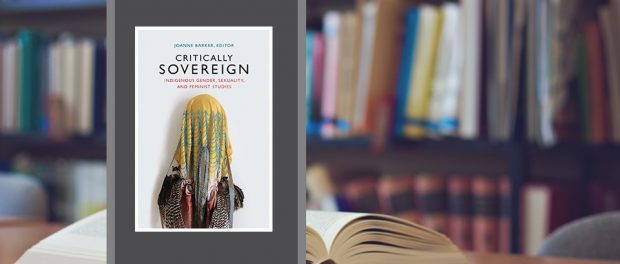Critically Sovereign—Indigenous Gender, Sexuality, and Feminist Studies
By Joanne Barker (Editor)

The collected essays in Critically Sovereign use the history of colonization to highlight Westernized concepts of gender, sexuality, and feminism in indigenous histories and identities. The works explore the complexities of LGBTQ, feminist, and gender equality from within traditions of indigenaeity. By marking the correlations (and often the conflicts) between pre and post-colonial notions of gender, sexuality, indigenaeity, and Nationhood, the authors deconstruct a variety of cultural pre-conceptions, practices, rules, and identities.
Barker’s introduction positions the collection within a context of ongoing colonialism, while also suggesting that there is a difficult and sometimes absent connection of gender, sexuality, and feminism in Critical Indigenous Studies (CIS). She also focuses the writings within a discussion of sovereignty, nationhood, and self-determination. While the subjects are diverse, within them all is a desire to examine indigenous histories from a new and focused perspective of gender, sexuality, and feminism. Pieces in the collection explore subjects such as: the social constructs of Hawaiian history and the pre-colonial acceptance of non-heteronormative relationships; the colonial practices that normalized patriarchy and heterosexuality among the Dine; how violence has continued to be a highly sexualized and gendered experience for indigenous populations; ways in which depictions and expectations of hyper-maleness have been constructed in post-colonial indigenous communities; and the historically sexualized eco-narrative of women in indigenous oral literature. Essays also explore how nationhood and forward-moving indigenous identities will need to continue to critically examine the conflicts between pre-colonial and post-colonial indigenous ways of being and believing.
The text is dense and aimed at grad-students with an ability to work in both feminist and indigenous frameworks. As an educational tool, Critically Sovereign would be best suited to individual research. An approach to connecting this collection to teaching or educational settings would be to consider the pieces as a tool to question the colonial lens through which so much feminist, gender, and sexuality work is seen. For those of us seeking to grow our equity work in educational settings, reading essays like those in this collection allow us to privilege-check our own approaches. The denseness of the material aside, each piece acts as a motivator for equity work and as a reminder that this work cannot be done in a vacuum, and can never be complete without an understanding of intersectionality.

Leave a comment